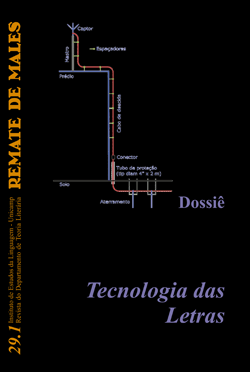Resumo
O presente texto busca articular o conceito de letramento (digital) com fundamentos da Teoria Ator-Rede, para refutar dois discursos dominantes sobre as (novas) tecnologias da escrita: o do determinismo tecnológico e o do neutralismo. Toma da referida teoria o axioma da inseparabilidade entre tecnologia e sociedade, assim como entre natureza e cultura. Propõe, a partir de conceitos-chave que derivam do axioma, uma concepção de letramento (digital) como rede heterogênea, constituída de associações entre humanos e não-humanos que, de forma simétrica, negociam interesses e interpretações. Aplica tal concepção a dados recuperados de uma pesquisa anterior, realizada sob outro enfoque teórico, com vistas a avaliar o poder explicativo da Teoria Ator-Rede no que tange a relação entre global e local em práticas "situadas" de letramento (digital).
Referências
BUZATO, M. E. K. Entre a Fronteira e a Periferia: Linguagem e Letramento na Inclusão Digital. 2007. Tese (Doutorado em Lingüística Aplicada) – Instituto de Estudos da Linguagem, Universidade Estadual de Campinas, Campinas, 2007.
BUZATO, M. E. K. Letramento e inclusão: do estado-nação à era das TIC. DELTA - Documentação de Estudos em Lingüística Teórica e Aplicada, v . 25, p. 1-38, 2009.
CHARTIER, Roger. A aventura do livro: do leitor ao navegador; conversações com Jean Lebrun. São Paulo: UNESP/IMESP , 1999.
CLARKE, J. Using actor-network theories for the study of literacy events and practices in global and local settings. International Literacy Conference, Cape Town. 2001. Disponível em http://www.ched.uct.ac.za/literacy/Papers/ClarkePaper1.html Acesso em 10 mai 2007.
DEUZE, Mark. Participation, Remediation, Bricolage: Considering Principal Components of a Digital Culture. The Information Society, Bloomington, v . 2, n. 22, p.63-75, 2003.
GEE, James Paul. The New Literacy Studies and the Social Turn. In: David Barton, Mary Hamilton, Roz Ivanic. Eds.. Situated Literacies: Reading and Writing in Context. London: Routledge, 2000.
GIBSON, J.J. The ecological approach to visual perception. New Jersey: L. Erlbaum, 1979.
GOODY, Jack. The Logic of Writing and the Organization of Society. Cambridge: CUP , 1986.
GOODY , Jack.; WATT, Ian. The consequences of literacy. Comparative Studies in Society and History, Cambridge, v. 5, n. 3, p. 304-45, 1963.
GOOGLE. Welcome to Google Enterprise. Disponível em <http://www.google.com/enterprise/ whygoogle.html> acesso em 12 Dez, 2009
HAMILTON, M. Priviledged literacies: policy, institutional process and the life of IALS. Language and Education, v.15, p. 178-196, 2001.
HEATH, Shirley Brice. Ways with words. Cambridge: Cambridge University Press, 1983.
IADEMA, R. A. M. Multimodality, resemiotization: extending the analysis of discourse as multi-semiotic practice. Visual Communication, v . 2, n.1, 2003 , p. 29–57.
KRESS, G. Gains and losses: New forms of texts, knowledge, and learning. Computers and Composition, v.22, n.1, p.5-22, 2005.
LADA, Adamic; ORKUT, Buyukkokten; Adar, EYTAN. A social network caught on the web. First Monday, v. 8, n. 6, 2003.
LATOUR, Bruno. Jamais fomos modernos: ensaio de antropologia simétrica. Rio de Jan.: Editora 34, 1994.
LATOUR, Bruno. Ciência em Ação: como seguir cientistas e engenheiros sociedade afora.São Paulo: Editora Unesp, 2000.
LATOUR, Bruno. Reassembling the Social: an introduction to actor-network-theory. NewYork: OUP , 2005.
LAW, John. Notes on the Theory of the Actor-Network: Ordering, Strategy, and Heterogeneity. Systems Practice, v.5, n. 4, p. 379-393,1992.
LEANDER, K; LOVVORN, J. F . Literacy Networks: Following the Circulation of Texts, Bodies, and Objects in the Schooling and Online Gaming of One Youth. Cognition and Instruction, n. 24, v . 3, p. 291–340, 2006.
MAINGENEAU, Domminique. O Contexto da Obra Literária. S. Paulo: Martins Fontes, 1995.
OLSON, David. From utterance to text: The bias of language in speech and writing. Harvard Educational Review, Cambridge, MA , v.47, n.3, p. 257-281, 1977.
PETERSEN, Søren Mørk. Loser Generated Content: From Participation to Exploitation. First Monday, v . 13, n. 3, 2008.
SCRIBNER, S.; COLE, M. The psychology of literacy. Cambridge, MA: Harvard University Press, 1981.
STREET, Brian V. Literacy in Theory and Practice. Cambridge: Cambridge University Press, 1982.
STRUM, Shirkey; LATOUR, Bruno. The meanings of social: from Baboons to Humans In: Social Science Information, v. 26, p. 783-802, 1987.
VIEIRA, Miguel Said. Bens comuns intelectuais: dos que temos aos que queremos. III Encontro Nacional Sobre Hipertexto, Belo Horizonte, MG – 29 a 31 de outubro de 2009, Anais.
WARSCHAUER, M. J. Technology and Social Inclusion: rethinking the Digital Divide. MIT Press, 2003.

O periódico Remate de Males utiliza a licença do Creative Commons (CC), preservando assim, a integridade dos artigos em ambiente de acesso aberto.

